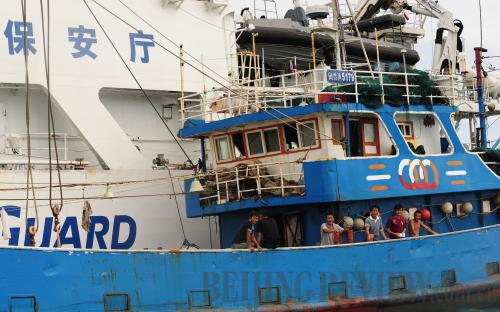 |
|
ILLEGAL DETENTION: A Chinese fishing trawler docks at a port in Japan's Okinawa Prefecture on September 9 after being intercepted by Japanese coast guards in waters off the Diaoyu Islands in the East China Sea (JI CHUNPENG) |
Japan decided to free the Chinese fishermen largely due to China's protests and countermeasures. Kan's victory in the party chief election also could have facilitated the captain's release. In addition, Sino-U.S. relations have warmed, with a number of high-ranking U.S. officials visiting China in recent weeks. The two sides have also agreed to a U.S. visit by Chinese President Hu Jintao next year. Washington does not want Sino-Japanese relations to deteriorate. It was wishful thinking for Tokyo to assume it could take advantage of tensions in the East China Sea.
Shelving differences
The Chinese Government exercised restraint when urging Japan to free the Chinese fishermen. It did not recall its ambassador to Japan, or deploy warships to the waters. Instead, it took regional peace and development into consideration, as well as encouraging trends in Sino-Japanese relations.
Bilateral ties have made headway since Junichiro Koizumi stepped down as Japanese prime minister in 2006. During Koizumi's tenure, the two countries' political ties were strained by his visits to the Yasukuni Shrine, which honors Japanese war dead, including convicted World War II war criminals.
Despite ongoing difficulties, the trend toward robust growth in bilateral relations has not changed. Notably, exchanges between Chinese and Japanese media professionals, entrepreneurs and young people have gained momentum in recent years. Many Chinese visitors to Japan are impressed by the two nations' shared cultural traditions; this will contribute to strengthened bilateral ties.
There is reason to be optimistic about the future of Sino-Japanese relations. The two countries are expected to overcome the setback in the near future. They can at least shelve disagreements until they come up with a wiser solution to their territorial disputes.
Chinese Premier Wen Jiabao held a meeting with Kan on the sidelines of the eighth Asia-Europe Meeting in Brussels on October 4. Wen said it is in the fundamental interest of both nations to advance the "strategic relationship of mutual benefit." The brief meeting conveyed that the two leaders hope to see progress in bilateral relations.
Chinese and Japanese leaders are likely to hold a formal meeting during the Asia-Pacific Economic Cooperation forum in Japan in November. With that, the two countries will be able to overcome the difficulties and move forward in their relations.
Although Japan now attaches greater importance to its relations with Asian countries than ever, it still considers its alliance with the United States the cornerstone of its foreign policy. This, among other factors, indicates Sino-Japanese relations will not be problem free.
Yoshikazu Kato, a Japanese writer who has studied in China, has called on the Japanese people to gain an unbiased picture of the changing China. He also suggested the two countries establish a crisis management committee consisting of dignitaries from the cultural, academic and media circles.
Such a committee may help the two countries avoid friction resulting from differences in national conditions and political systems. It is important for China and Japan to create diverse mechanisms to ensure the stable and healthy development of their bilateral ties.
The author is a guest research fellow with the Center for Japanese Politics of the Chinese Academy of Social Sciences
| 